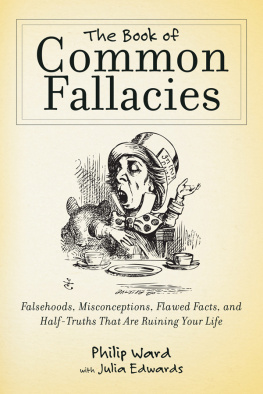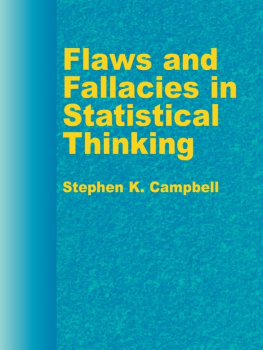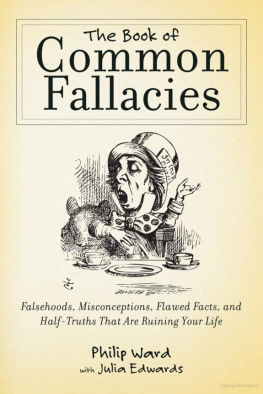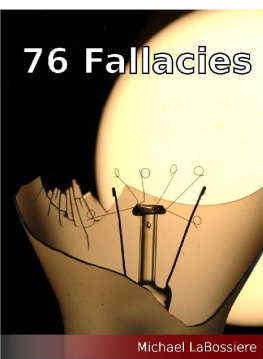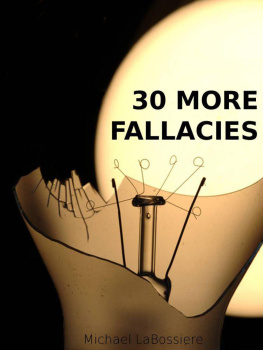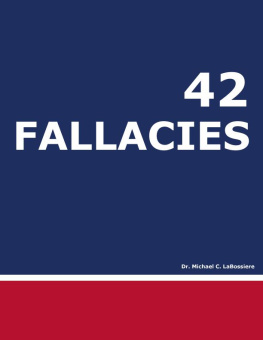Philip Ward - The Book of Common Fallacies
Here you can read online Philip Ward - The Book of Common Fallacies full text of the book (entire story) in english for free. Download pdf and epub, get meaning, cover and reviews about this ebook. year: 2012, publisher: Skyhorse Publishing (Perseus), genre: Romance novel. Description of the work, (preface) as well as reviews are available. Best literature library LitArk.com created for fans of good reading and offers a wide selection of genres:
Romance novel
Science fiction
Adventure
Detective
Science
History
Home and family
Prose
Art
Politics
Computer
Non-fiction
Religion
Business
Children
Humor
Choose a favorite category and find really read worthwhile books. Enjoy immersion in the world of imagination, feel the emotions of the characters or learn something new for yourself, make an fascinating discovery.
- Book:The Book of Common Fallacies
- Author:
- Publisher:Skyhorse Publishing (Perseus)
- Genre:
- Year:2012
- Rating:3 / 5
- Favourites:Add to favourites
- Your mark:
- 60
- 1
- 2
- 3
- 4
- 5
The Book of Common Fallacies: summary, description and annotation
We offer to read an annotation, description, summary or preface (depends on what the author of the book "The Book of Common Fallacies" wrote himself). If you haven't found the necessary information about the book — write in the comments, we will try to find it.
The Book of Common Fallacies — read online for free the complete book (whole text) full work
Below is the text of the book, divided by pages. System saving the place of the last page read, allows you to conveniently read the book "The Book of Common Fallacies" online for free, without having to search again every time where you left off. Put a bookmark, and you can go to the page where you finished reading at any time.
Font size:
Interval:
Bookmark:
BOOKS BY PHILIP WARD
Poetry
Collected Poems, 1960
Seldom Rains, 1967
At the Best of Times, 1968
The Poet and the Microscope, 1969
Maps on the Ceiling, 1970
A House on Fire, 1973
Impostors and their Imitators, 1977
The Keymakers, 1977
Drama
A Musical Breakfast, 1968
Garrity and other Plays, 1970
Pincers, 1973
Television Plays, 1976
Travel
Touring Libya, 3 vols., 1967-9
Tripoli, 1969
Touring Iran, 1970
Sabratha, 1970
Motoring to Nalut, 1970
Touring Cyprus, 1971
The Way to Wadi al-Khail, 1971
Touring Lebanon, 1971
Come with me to Ireland, 1972
The Aeolian Islands, 1973
Bangkok, 1974
Indonesia: a Travelers Guide
(as Darby Greenfield), 2 vols., 1975-6
Fiction and Essays
The Okefani Song of Nij Zitru, 1966
Ambigamus, or The Logic Box, 1967
Apuleius on Trial at Sabratha, 1968
The Quell-Finger Dialogues, 1969
A Lizard and other Distractions, 1969
A Maltese Boyhood, 1976
Librarianship
Simplified Cataloguing Rules (with R. Cave), 1959
A Survey of Libyan Bibliographical Resources, 1964
The Libyan Research Library Catalog, 1970
Planning a National Library Service, 1973
Indonesia: the Development of a National Library
Service, 3 vols., 1976
Literature
Spanish Literary Appreciation, 1969
Indonesian Traditional Poetry, 1975
The Oxford Companion to Spanish Literature, 1978
Copyright 1978, 1980, 2012 by Philip Ward and The Oleander Press
Additional content 2012 by Skyhorse Publishing, Inc.
Originally published as A Dictionary of Common Fallacies by The Oleander Press, Cambridge, United Kingdom
All Rights Reserved. No part of this book may be reproduced in any manner without the express written consent of the publisher, except in the case of brief excerpts in critical reviews or articles. All inquiries should be addressed to Skyhorse Publishing, 307 West 36th Street, 11th Floor, New York, NY 10018.
Skyhorse Publishing books may be purchased in bulk at special discounts for sales promotion, corporate gifts, fund-raising, or educational purposes. Special editions can also be created to specifications. For details, contact the Special Sales Department, Skyhorse Publishing, 307 West 36th Street, 11th Floor, New York, NY 10018 or .
Skyhorse and Skyhorse Publishing are registered trademarks of Skyhorse Publishing, Inc., a Delaware corporation.
www.skyhorsepublishing.com
10 9 8 7 6 5 4 3 2 1
Library of Congress Cataloging-in-Publication Data
Ward, Philip, 1938
The book of common fallacies : falsehoods, misconceptions, flawed facts, and half-truths that are ruining your life / Phillip Ward ; with Julia Edwards.
p. cm.
Updated ed. of authors: Dictionary of common fallacies, c1988.
ISBN 978-1-61608-336-6 (alk. paper)1. Common fallacies--Dictionaries. I. Edwards, Julia. II. Ward, Philip, 1938- Dictionary of common fallacies. III. Title. AZ999.W36 2012 001.9'6--dc23
2012006614
Printed in the United States of America
Originally published more than three decades ago, The Book of Common Fallacies sought to educate, entertain, and enlighten at a time when there was no internet, personal computers were extremely rare, and smartphones and internet-connected tablets only existed in the minds of science fiction writers. Nevertheless, Philip Ward managed to pack the original two volumes full of myth-debunking knowledge, much of it still relevant even today in our always-connected, instant-answers-at-our-fingertips world.
In this new single-volume edition, we have left the majority of Wards original text and style unchanged, only deleting those entries that were truly outdated (though we retained those entries that were outdated but histotrically interesting). In addition, we have added more than a hundred brand-new entries to address some of the myths, urban legends, and common misconceptions that plague modern society today. Youll find these entries in gray boxes.
The Book of Common Fallacies deals not only with the narrow field of purely logical fallacies, but also with a number of important ideas or theories common either now or in the past which have been proved wrong by scientific experiment or observation, or are so intrinsically improbable that their widespread acceptance should be questioned.
The Latin word fallere (to escape from, deceive) gave the Vulgar Latin fallire (to commit a fault, deceive, fail), and the adjective fallax (deceptive), which provided the English adjective fallacious through fallaciosus. In classical logic, a fallacy is understood to denote an argument violating the laws of correct demonstration; more generally, it refers to any mistaken statement used in argument, while in common parlance is understood in the even wider sense of a mistaken view which is held by a relatively large number of people in spite of its having been disproved by some form of scientific or logical test.
For a mind, let us not say exactly ignorant, but shall we say superficial, a work on popular errors might appear quite useless. Why, indeed, he might complain, give the slightest attention, the least emphasis to those daydreams which occupy the brain of the common people, old wives, nurses, and children? asked Louis Pierre Francois Adolphe, Marquis de Chesnel de la Charbouclais, in mock despair, before contributing 1360 closely printed columns of popular fallacies to Mignes Troisime et dernire encyclopdie thologique (Paris, 1856, vol. 20).
Why indeed! As if it were not provocation enough to read newspapers and magazines still containing horoscopes in the 1970s, to see shelf upon shelf of fashionable occult literature in otherwise reputable bookshops, fanatic religious sects springing up to make claims of miracle-working and Messianity, extremist political groups seeking converts among the badly educated and the confused, and pseudo-sciences making untestable and incredible claims. However, a dictionary which exhaustively attempted to examine all the various fallacies which have bewitched, beguiled, and bemused the minds of men (and women) would fill an anti-encyclopedia more voluminous than that of the Marquis de Chesnel de la Charbouclais. The intention of the present work is not so ambitious: it merely offers to anatomize some of the popular beliefs which have been shown to be false by those without a vested interest in deceiving the multitude for power, wealth or prestige.
The compiler has taken to heart the three mildly skeptical attitudes proposed by Bertrand Russell in Let the people think (London, 1941, p. 2):
- That when the experts are agreed, the opposite opinion cannot be held to be certain;
- That when they are not agreed, no opinion can be regarded as certain by a non-expert;
- That when they all hold that no sufficient grounds for a positive opinion exist, the ordinary man would do well to suspend his judgment.
These opinions may seem mild, wrote Russell, yet, if accepted, they would absolutely revolutionize human life. The opinions for which people are willing to fight and persecute all belong to one of the three classes which this skepticism condemns. When there are rational grounds for an opinion, people are content to set them forth and wait for them to operate. In such cases, people do not hold their opinions with passion; they hold them calmly, and set forth their reasons quietly. The opinions that are held with passion are always those for which no good ground exists; indeed the passion is the measure of the holders lack of rational conviction.
Next pageFont size:
Interval:
Bookmark:
Similar books «The Book of Common Fallacies»
Look at similar books to The Book of Common Fallacies. We have selected literature similar in name and meaning in the hope of providing readers with more options to find new, interesting, not yet read works.
Discussion, reviews of the book The Book of Common Fallacies and just readers' own opinions. Leave your comments, write what you think about the work, its meaning or the main characters. Specify what exactly you liked and what you didn't like, and why you think so.

